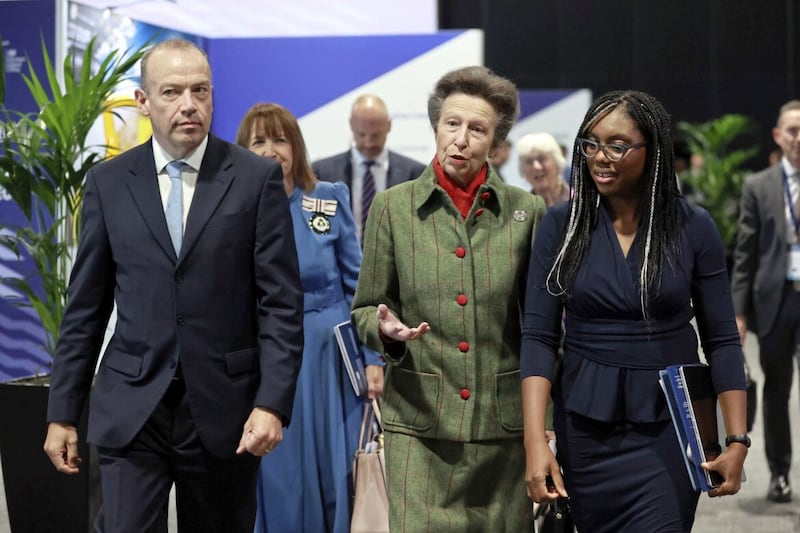TIMES are tough for firms, as the cost of doing business continues to take its toll. Many households too are finding it harder to stay afloat. For many of the same reasons which no doubt you will have read about.
Number one on that list is inflation. With CPI now running at 9.1 per cent - a dizzying 40-year high – companies and households are increasingly having to make difficult choices how to manage their money.
Companies really do understand how trying these inflationary times are for their employees and customers alike. Increasingly, they are reaching out to us here at the CBI to find out what other firms are doing to support their people.
The number of businesses in Northern Ireland taking action to help employees navigate through this crisis is increasing by the day. There have been many examples of companies taking the initiative and doing what they can to help.
One local firm has announced a pay increase of £2,000 or 5 per cent in addition to staff salary. Another company is offering a £500 one-off payment to employees to help cope with rising costs. While some employers have felt able to offer one-off bonuses to support staff, others have mentioned that offsetting national insurance rises has been a beneficial method of ensuring that employee take home pay does not change.
As employees look at the numerous ways they can tighten their belts, some have chosen to reduce or even stop their pension payments. Undoubtedly concerned by this, many businesses are continuing to pay into employee pensions even if employees choose to pause their contributions.
While some companies are taking this moment to look at salaries and consider what support employees need to cope with rising costs, there are also many that cannot offer pay increases and must explore other types of support.
Firms tell me they are ramping up discounted lunches in the workplace and exploring with travel providers how to make travel tickets work for hybrid workers. Employees really value transport cost subsidies, such as support in purchasing seasonal rail tickets or being able to access cycle-to-work schemes.
With these initiatives, they can consider different ways to get into work which offset rising fuel costs. Some firms have reported receiving an alarming number of permission requests from employees to take on a second job and a few firms have offered additional work hours to some staff to save them from having to look elsewhere.
Businesses also recognise the strain of the cost-of-living crisis on people’s physical and mental health. Providing employees with online support, as well as additional health benefits has been helpful for employee wellbeing.
For some parts of the Northern Ireland economy, hybrid working can be an important part of supporting staff through this inflation crisis. Firms are giving employees more flexibility to work from home, which has helped staff struggling to meet increasing transport and fuel costs. Some firms have even changed their work patterns to enable employees to work over the weekend. This way, staff can save on childcare costs during the week.
And this is not just in Northern Ireland, right across the CBI, we’ve heard of lots of other solid
examples of what firms are doing to help employees, with initiatives ranging from financial assistance to flexible hours. However big or small that support might be, virtually all firms are considering what more they can do for their workers.
As I write this piece and think about all the efforts businesses are taking to manage the impact of this latest rise in the cost of living and doing business; my mind also turns to the dire need for Northern Ireland to have a functioning Executive.
Although this region has had one of the strongest GDP bounce backs following the Covid-19 pandemic, second only to London, the local economy is still expected to face strong headwinds as we move to the second half of this year.
Issues with broken supply chains, a depreciated pound (which will raise import prices further), lack of labour and uncertainty around the NI protocol – these will all undoubtedly take their toll on our economic performance. Fuel poverty is rising, and cost of living crisis will be felt most acutely by low-income households. There is no doubt that political leadership is needed like never before.
As demonstrated above, the business community is always ready to change and adapt. They are supporting employees in all sorts of ways that have not been done before. But we now need politicians to step up and draw on the same resources that we drew on when we weathered the pandemic storm. Firms will undoubtedly lead their employees through this crisis.
But not everyone is in employment - and times ahead are about to get extremely tough, especially for the economically inactive and pensioners. The business community alone cannot carry the burden of delivering economic growth and maintaining living standards. We need an Executive to deliver the policy environment for economic growth.
This economy will be severely restricted without long-term departmental budgets, reform of the planning system, delivery of large-scale infrastructure projects and the implementation of strategies in areas such as energy, tourism, green growth and skills. We all depend on a sitting Executive to deliver those much-needed economic enablers – this is very much a time for “all shoulders to the wheel”.
Angela McGowan is CBI Northern Ireland director.








